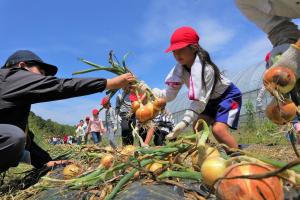Press Release (May 31, 2023)
Kobe City School Lunch Association
Hara and Inagaki
Purpose
The Kobe City School Lunch Association was established as an external organization specializing in school lunch to strengthen the food procurement business for school lunch and to promote nutrition education projects, and started its operations in September 2018.
We are now implementing the “Le*Lu*Lu Program”, one of the Association’s projects to promote nutrition education and local production for local consumption, in collaboration with agricultural producers, JA, and other organizations.
Through this program, we aim to help children develop an understanding of “food,” “agriculture,” and “community,” as well as a sense of gratitude to producers. 
Details
○Outline
The “Le*Le*Le Program” is a food education program in which elementary school students learn how foodstuffs for school lunches are produced and provided for school lunches through agricultural experiences in Kobe’s nature-rich rural areas.
This time, participants will experience “onion harvesting.
(Le*Lu*Lu is named after “grow,” “harvest,” and “eat at
school lunch”)
○ Onion Harvesting Experience
*Start times are approximate.
・Kobe Elementary School 3rd Graders
June 5, 2023 (Monday) ①9:45~ (Assembly 9:30), ②13:30~ (Assembly 13:15)
・Honyama 1st Elementary School 4th Graders
Thursday, June 8, 2023 (1) 9:45~ (Assembly 9:30), (2) 13:30~ (Assembly 13:15)
<Location>
3080 Kami-Osawa Fureai Kaikan, Osawa-cho, Kita-ku, Kobe City
Please contact us by 17:00 two days prior to each event date if you can come to cover the
event. (
Kobe City School Lunch Association’s Business Overview
○School Lunch Ingredient Procurement Business
Kobe
City School Lunch Association
procures and stably provides “safe” and “good quality” side dish ingredients for school lunch in elementary and junior high schools. (About 100,000 servings/day, 100% of rice is produced in Kobe City)
○ Nutrition Education and Promotion of Local Production for Local Consumption
We promote local production for local consumption by connecting schools with agricultural producers, JA, companies, etc., and collaborating with them to implement nutrition education programs, giving priority to locally grown rice, vegetables and processed products.
 KOBE
KOBE Akashi
Akashi















 MeIN
MeIN Gooall
Gooall shAop
shAop Global
Global